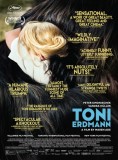Toni Erdmann Movie Review
 |
Toni Erdmann
US Theatrical Release: December 25, 2016 (German Release: July 14, 2016) / Running Time: 162 Minutes / Rating: R Writer/Director: Maren Ade Cast: Peter Simonischek (Winfried Conradi/Toni Erdmann), Sandra Hüller (Ines Conradi), Michael Wittenborn (Henneberg), Thomas Loibl (Gerald), Trystan Pütter (Tim), Hadewych Minis (Tatjana), Lucy Russell (Steph), Ingrid Bisu (Anca), Vlad Ivanov (Illiescu), Victoria Cocias (Flavia) |
Toni Erdmann, a nearly three-hour German-Austrian dramedy, is considered one of the frontrunners in this year's Best Foreign Language Film Oscar race. The film is written and directed by Maren Ade, the third such feature of the past thirteen years to have been made in such fashion.
Our first impression is that this film is about Winfried Conradi (Peter Simonischek), a German man in the latter part of middle age. Rotund and always disheveled, the white-haired Winfried believes in having fun, from playing a joke on a delivery man to donning deathly make-up to lead a school music performance. But, although our focus shifts from father to daughter, Mr. Conradi is not really gone. He soon resurfaces in a ridiculous caveman wig and dentures he usually carries around in his front shirt pocket. Winfried identifies himself as Toni Erdmann, a consultant with influential clients of his own. Ines kind of puts up with her father's charade, not having any better idea about how to keep him occupied while she remains busy with work and putting together a potential outsourcing plan for a client named Henneberg (Michael Wittenborn).
Ines keeps crossing paths with "Toni Erdmann", though, and eventually the two begin to collaborate, visiting an oil station and crashing a party where "Toni", posing as German ambassador, plays keyboard and Ines, posing as his secretary, sings Whitney Houston's "Greatest Love of All." It's a poignant moment of father and daughter spending time together while on the same page for the first time in a long time. This is fleeting and next we wind up at a party Ines hosts that somehow spontaneously devolves into a naked party, Like a dramedy should, Toni Erdmann finds a happy balance of comedy and drama. Some scenes, like that naked party, are explicitly played for laughs. Others manage to amuse while delving into this father-daughter relationship, that has grown strained simply from ordinary adult responsibilities. Clearly, the roles have been reversed, with the teddy bear-like Winfried being more of a kid to his responsible daughter. And that rubs off on her a little in a moving way.
Toni Erdmann is appealing and kind of sweet, even through some strange beats (e.g. a sex scene involving "petit fours"). It reinvents itself repeatedly and subverts expectations that American comedies lead you to form. It ends abruptly and openly. Having seen very few 2016 foreign films, I can't say with any certainty that this is one of the's years best foreign language films (even if a lot of it is in English). But the consensus forming around it suggests that it is, and as Germany's official selection, it has a great shot at winning.
|
Related Reviews:
DVDizzy.com | DVD and Blu-ray Reviews | New and Upcoming DVD & Blu-ray Schedule | Upcoming Cover Art | Search This Site
DVDizzy.com Top Stories:
Now in Theaters: Elle • Moonlight • Manchester by the Sea • La La Land • The Founder • Gold • The Comedian • 20th Century Women
Austrian-German Cinema: The Strange Little Cat • Labyrinth of Lies • Goodnight Mommy • The Counterfeiters
Text copyright 2017 DVDizzy.com. Images copyright 2016 Sony Pictures Classics.
Unauthorized reproduction prohibited.
